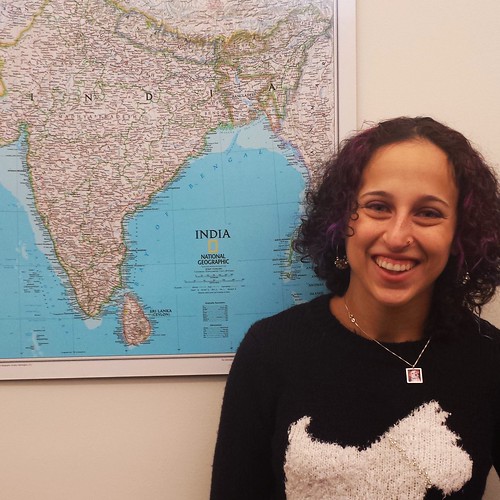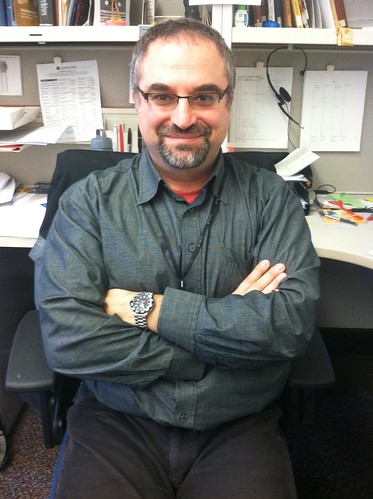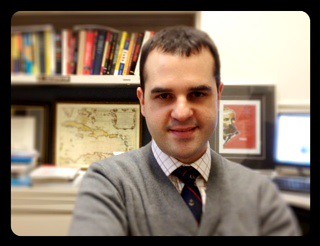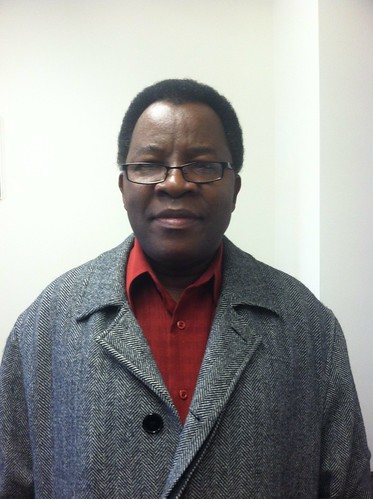For another installment of our staff introductions, I interviewed Joe Lenkart, Interim Manager, Slavic Reference Service (SRS) and the Reference Specialist for Central Asia. Among other accolades, Joe was presented with the Outstanding Academic Professional’s Award from the University of Illinois’ Library in August.
Joe Lenkart has a Masters in Library and Information Science and a MA in Russian and East European Studies. Although he completed his undergraduate studies majoring in Chemistry, his academic and professional interests shifted towards history after attending a lecture on the Eurasian Steppe. Joe has also furthered his scholarly pursuits by volunteering in the Peace Corps. He was stationed in Smolensk region of western Russia.
What are you most excited about working on here at the IAS Library? Do you have any upcoming projects you’d like to share?
I am naturally excited about working in the same area that I went to high school. We are in a very unique place. Every summer we have people from all over the world coming here to use our collections. This is a tremendous honor for the State of Illinois and the University Library. It is also a morale booster and a treat because, as a manager of the reference service, I feel good about the audiences we serve.
In terms of future undertakings, we have a collection maintenance project that will involve reorganizing the Slavic microfiche collection, and we will unveil a portals database for Russian, East European, and Eurasian Studies. This is a fully annotated, searchable database. Academic portals in Russia and Eastern Europe are much different because they are repositories for academic content and the community aspect for conducting research. These innovative resources have no equal in North America.
Please describe your typical work day at the library.
I arrive at approximately 7:45 am and I don’t leave until around 5:00 pm. In addition to working with the ILL department, we provide citation verification services, and answer international phone, chat, and email reference inquiries. For our funding agencies, we prepare specialized research guides. This workload continues despite additional projects.
What are your Slavic research and collection development interests?
I am really interested in the indigenous peoples of Siberia – ethnology of these ethnic groups, and specifically their religious identities. These resilient groups have been subjugated very harshly, and yet they have left behind a rich legacy.
What are some of your proudest accomplishments as a librarian, or any other field prior to your appointment as a librarian?
The recent academic professional award; but more importantly, the Slavic Reference Service gets regularly mentioned by national libraries. We are known as a reliable service and that is the proudest accomplishment.
What attracted you to the field of Library Science and your area of specialty?
For this field you must have an overdose of curiosity. It is a field for curious people and it was a perfect fit for me, having worked as a page at the Champaign Public Library and a clerk at the Douglas Branch. While working as a graduate assistant at the Undergraduate Library, I applied for another assistantship in the Slavic Library. After I was granted the assistantship, I was trained in general and specialized reference. The attraction to the profession was based on my admiration for my colleagues in the Undergraduate Library and the Slavic Reference Service [past and present]. My colleagues are hard-working and above all, they are selfless and extremely generous with their time.
Tell us a little bit about your background. Where did you grow up? What languages do you speak? Etc.
I will use a Bob Dylan line to answer that question: “I was born very far from where I’m supposed to be, and so, I’m on my way home.” I can work with Russian, Turkish, Farsi, and took two years of Hebrew. I took Farsi at Indiana University, Central Eurasian Studies. I also took Spanish for five years during my undergraduate years.
Do you have any career advice for someone interested in librarianship, specializing in Slavic Languages and Literatures?
My best advice is to get your hands dirty. Get to know the physical setting of your workplace. I would recommend that before graduating with a degree in library and information science, you must have your toolkit ready to go for your area of service. You have to adapt with these sources and try to use them on a daily basis. Get back to basics. Theories come and go, but what remains is work. You have to like the daily work of libraries. You have to be willing to spend hours (days) on a reference question. If you cannot do this part, unfortunately, you will need to focus on research.
What is your favorite thing to do in the Champaign-Urbana area?
My favorite thing to do is spending time with my kids in Homer, Illinois.
What is your favorite place you’ve visited, local or anywhere in the world?
My favorite places I’ve visited are Kyrgyzstan and Uzbekistan. Most of my graduate career was spent studying these places. It was a real treat to see the places that I researched. For example, the famous Russian geographer Nikolai Mikhailovich Przheval’skii grew up in the village in the Smolensk region of Russia, where I was stationed during my volunteer work with the Peace Corps. I also went on an excursion to the town of Karakol (in Kyrgyzstan) where Przheval’skii died.
If you could have a signed copy of any novel or non-fiction what would it be and why?
If I could have something signed, it would be Great Expectations by Mr. Charles Dickens and The Red Badge of Courage by Mr. Stephen Crane. The characters in these novels made a strong impression on me.
What movie and/or book are you looking forward to this academic year (2013-2014)?
I am definitely looking forward to the Star Wars revamp. I’m a huge fan of science fiction films and, of course, the Walking Dead.






